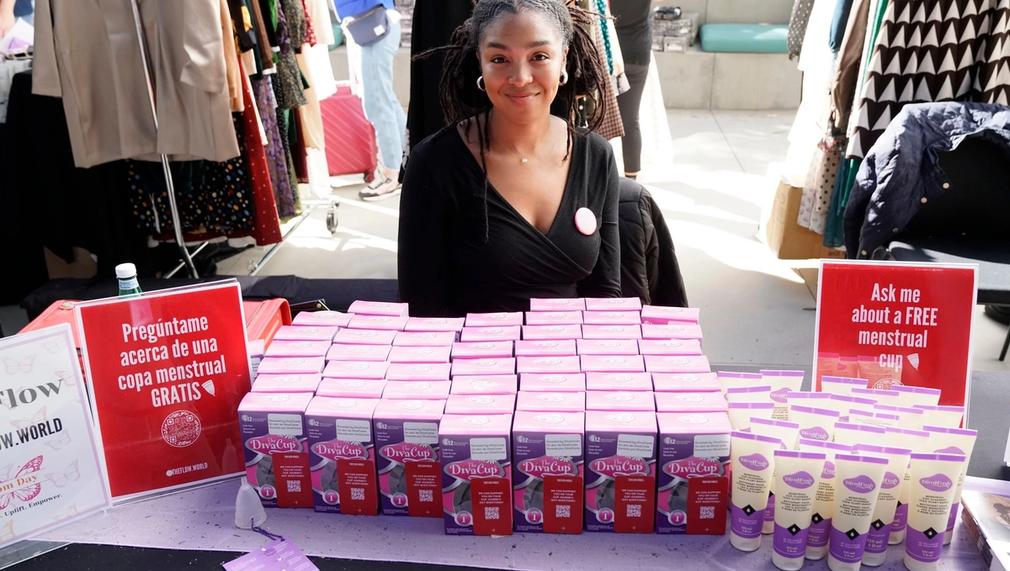Innovative Solution to Period Poverty and Stigma in LA County
Help provide menstrual cup education & distribution of free cups - the most affordable, healthiest, greenest way to manage periods - to the least resourced women/girls in LA, giving them empowering knowledge & products they can reuse for up to 10 years! If even 1000 people switched to cups, they could save between $4-8 million & keep 12-16 million single-use products out of landfill/septic/ocean. This program addressed a basic gendered need that disproportionately impacts people of color & is unique, scalable with amazing return on investment.

What is the primary issue area that your application will impact?
Food insecurity and access to basic needs
In what stage of innovation is this project, program, or initiative?
Pilot or new project, program, or initiative (testing or implementing a new idea)
What is your understanding of the issue that you are seeking to address?
Every day in LA County, the lives, dignity, health, & potential of women/girls are being compromised by not having enough safe, affordable period products. It’s not a new problem but it’s unacceptable. Period poverty, affecting over 500,000 people here, is captured in poverty data. In 2023, LA County had the highest poverty rate in CA at 15.5%. 21% of Black, 18% of Latine,12% of Asian, and 11% of White women live below the federal poverty level as do 18% of people under 18. 1 in 3 households headed by single mothers live in poverty. Though managing periods is a basic need, period products are not covered by any assistance programs. This unequal access to period products perpetuates shame/inequities. Women/girls miss work/school, they don’t change products as recommended or use toilet paper/socks which can affect health, families are forced to choose between products and food/rent. 68% of women who experience period poverty monthly show symptoms of depression. We must do better.
Describe the project, program, or initiative this grant will support to address the issue.
Our proposed solution to this problem - piloting free menstrual cups & cup education to reduce period poverty/stigma - is innovative & financially & environmentally sustainable. We are the ONLY organization doing this here but there is abundant research from other countries that high cup adoption rates (85%) can be achieved when cups are given free with education/support. One silicone menstrual cup can be reused for 10 years, used safely for 12 hours, has 1% of the carbon footprint of other products, protects absorptive vulvar tissue from exposure to toxins, decreases transmission of STIs & incidence of bacterial vaginosis. However, awareness of cups, how to use them, and access remain extremely low in underserved communities.
Our no-TMI workshops & free cup distribution empower women/girls with new tools; improve menstrual knowledge; address concerns about toxins in disposable products & plastic in our environment; offer greater self-sufficiency/body autonomy/incredible cost-savings for life-changing impact. We also address period stigmas and patriarchal norms. When a Lynwood High School teen says only “nasty girls” use inserted products or a mother at Alexandria House is anxious about period odor, our in-culture team creates safe spaces for discussion.
Funds will support expanding our work - more partners, in-person events & cup donations - and go towards a new system for supporting participants on their cup journeys & collecting data.
Describe how Los Angeles County will be different if your work is successful.
Over the grant period, we hope to provide cup education & donate 10K menstrual cups working with 50+ new community-facing partners to LA County’s least resourced women/girls.
We are ambitiously aiming for a 50% adoption rate. If even 5000 women/girls adopt cups, they could save themselves/their families between $20-40 million dollars and keep 60-80 million disposable products out of wastestream! Long-term, we hope to expand to provide cups to over 100K under-resourced women/girls in LA County over the next 5 years; collect cup adoption data to prove it would be feasible/smart for schools/jails/other programs to provide free cups; & collaborate on legislation so that ultimately all low-resourced people in LA County and beyond have cup awareness/education/access.
We envision a greener, more equitable County (and world!) where no one’s dignity, health/mental health, scholarship, livelihood or potential is compromised by a normal biological function without which none of us would be here!
What evidence do you have that this project, program, or initiative is or will be successful, and how will you define and measure success?
Since 2017, we’ve partnered with 50+ LA orgs & distributed 10K cups to low resourced, primarily Black & Latine women/girls, including many recent immigrants and first-gen Americans. Our anecdotal response is exciting. One teen shared: “I can go to school and work, less afraid of leaking on my clothes.” Another said: “I feel free, and I’m happy that I don’t have to ask my parents to spend money.” A small sample group adopted cups at 50% and reported they no longer experience a shortage of period products.
But many people need more support to try/adopt cups. We hope to increase in-person events, expand contact information collection & provide more educational support to people on their cup journeys through a new SMS (texting) system. This system will also allow us to get feedback to improve/adjust programming and collect data with surveys at 3, 6, 9 and 12 post-events to better track cup adoption rates & increase them to power broader systemic change.
Approximately how many people will be impacted by this project, program, or initiative?
Direct Impact: 1,000.0
Indirect Impact: 10,000.0